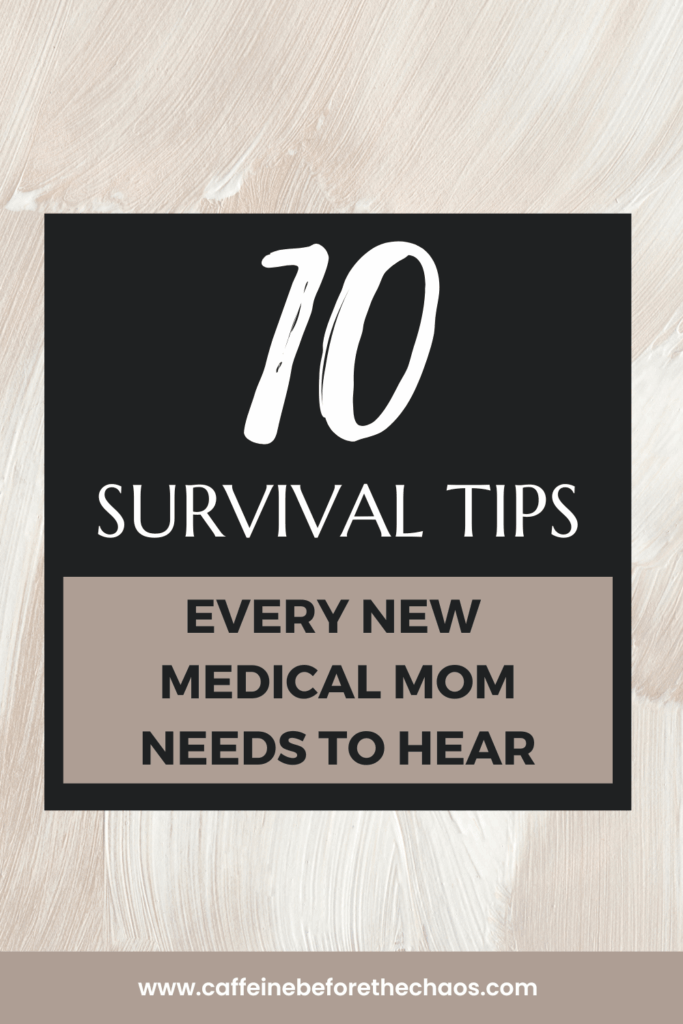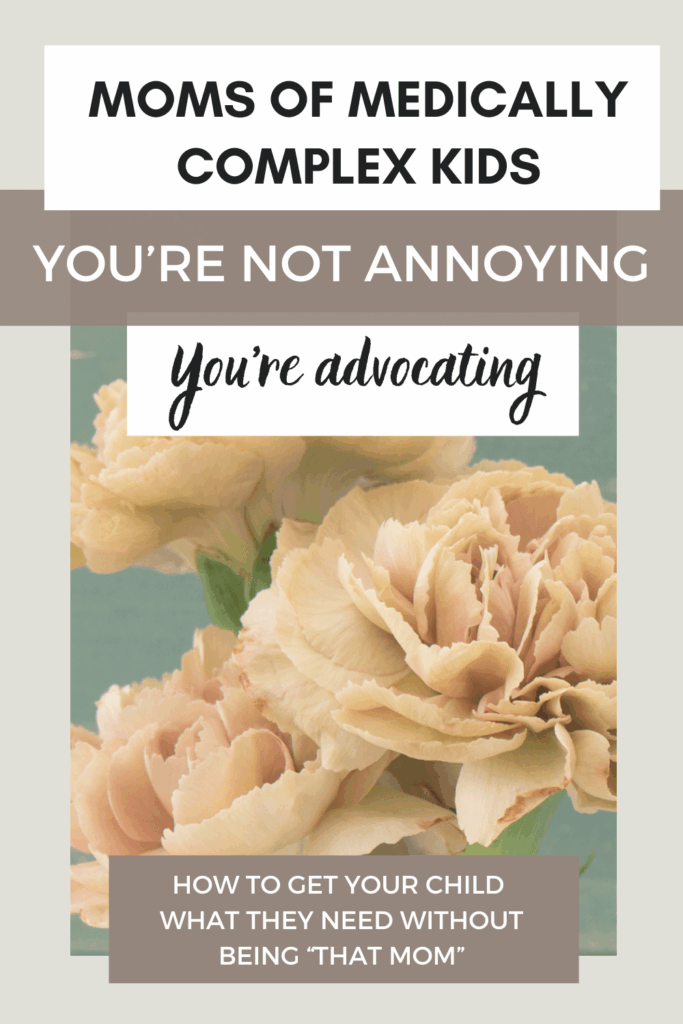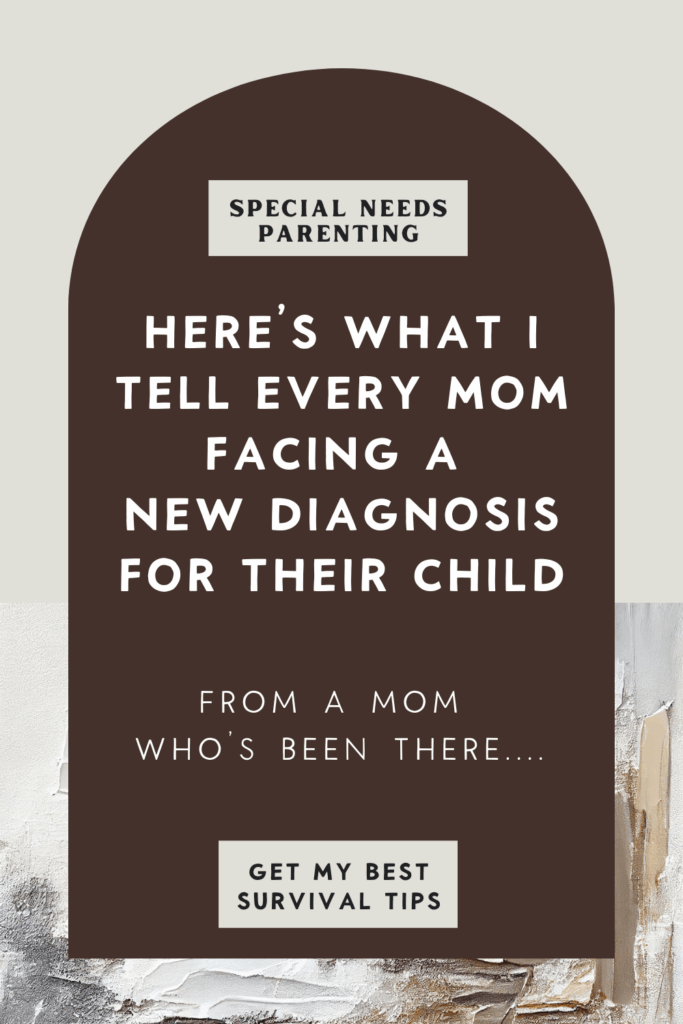Just got a scary diagnosis? This post is for the mom who’s overwhelmed, googling symptoms at 2am, and just trying to breathe. Here are 10 things I wish someone had told me at the beginning of our medical mom journey — real medical mom survival tips from a NICU mom who’s lived it.
You Don’t Forget the Day It All Changed
We were in the NICU. Christmas lights blinking outside, beeping monitors inside. I was in our little corner of the four-bed room, sitting like it was any other day of rounds. Then I noticed how many people were there. Way more than usual. That was my first clue.
This wasn’t a “he’s tolerating feeds great!” kind of round. This was a something is very wrong moment. They dropped the words: Periventricular leukomalacia. PVL. Later that would become cerebral palsy. And I would learn that I am now what people call a “medical mom.” But in that moment? It felt like someone yanked the floor out from under me.
I nodded. I held back tears. I tried to listen. They moved on to the next baby.
And I broke.
COVID rules meant only two visitors at a time, so I let my mom go in while I sat with my dad in the waiting room—and that’s when it hit. Full-on hyperventilating, shaking, “I can’t do this” kind of panic. I didn’t want the doctors—or even my baby—to see me like that. I thought I had to be strong. That crying would make me less able to think.
But out in the hallway, the mask came off and the tears poured out.
His occupational therapist found me there, talked me down, and said something I still hear in my head today:
“No doctor can tell you what his future looks like. Only he can do that. And everything he’s done so far? He’s shown you he’s a fighter.”
So if you’re sitting in the hallway after hearing news that shattered your world? This is for you. These are the survival tips for medical moms I wish someone had handed me that day—real ones from a mom who’s still in it.
📝 Side note: I put together a free Cheat Sheet with questions to ask your child’s care team — the exact ones I wish I’d had back when I was spiraling on Google. Grab it here.
1. You don’t need to become a medical expert overnight

When I heard “PVL,” my brain immediately went to Google. And let me tell you—I wish it hadn’t.
I read things that made me spiral. I convinced myself my son wouldn’t walk. Wouldn’t talk. Would never use his limbs. That he’d be completely dependent forever.
And while those things are possible for some kids with that diagnosis… it wasn’t true for mine. That’s the thing no one tells you: there’s no single outcome. The brain is wild and unpredictable. And every child is so, so different.
If you’re in the middle of a rabbit hole, let me be the one to tell you—it’s okay to ask questions, but don’t assume the worst-case scenario is your child’s future.
Google doesn’t know your baby. And you don’t have to learn it all in one night.
Related: Medical Mom Burnout Nearly Broke Me- Until I Did This
2. Create a “drop everything” folder
You know the moment—you get a call, or a form is due, or you’re in the ER and someone asks, “Do you have a copy of his last imaging results?” and your brain freezes.
Having a physical folder with key documents—like diagnosis letters, insurance approvals, therapy evals, and medication lists—has saved me more times than I can count. When I was applying for secondary insurance, they wanted two years of receipts and medical expenses. Some of that paperwork wasn’t even available online.
If you can’t find it in your medical portal (like MyChart), and you didn’t save the paper copy, it’s probably lost forever.
3. Always ask for copies
I know this one feels basic, but trust me—it matters.
There are entire types of documents that live in limbo between departments and never make it to your online portal. And when you need them (usually at the worst possible time), you’ll be so glad you asked for a printed copy.
4. You’re not annoying. You’re advocating.
We once went to the ER because of a cough—and a huge, visible lump on my son’s neck. The doctors brushed it off as swelling from a croup cough, gave us steroids, and sent us home. By the next morning, the lump had doubled in size.
We called our doctor in a panic, and they rushed us back to the ER. The new team was horrified we’d been discharged. It turned out to be an infected gland that needed to be surgically drained.
And yes, he still had croup while going through that surgery.
So no—you are not being overprotective. You’re not dramatic. You’re a mom who knows when something isn’t right. And if it doesn’t sit well with you, keep pushing. Keep asking. You don’t need a medical degree to recognize that your child’s health deserves a second look.

5. One small win a day is enough
Some days, all I could do was remember to feed myself. Or call the insurance company. Or not cry during therapy.
Those things count.
We live in a world that praises productivity and constant motion. But when you’re managing a medically complex child, your energy is already stretched to the limit. One task done? That’s a win. Celebrate it.
6. Find your person
For me, that’s my husband. We can look at each other and just *know* what the other is thinking during a hospital stay.
But in the NICU, I found unexpected lifelines in the other moms around me. There’s something sacred about sharing space with someone who understands the language of monitors, tube feeds, and missed milestones.
You don’t need a hundred friends. One person who gets it—truly gets it—is enough.
7. Every kid is different. Seriously.
You could line up five kids with the same diagnosis and they’d all have wildly different strengths, challenges, and personalities. CP doesn’t look the same in every child. Neither does PVL, or feeding tubes, or seizure disorders.
Stop trying to predict the next five years based on someone else’s journey. Focus on your child. Watch them write their own story, one inchstone at a time.
Related: The Brutal Truth About the Medical Mom Comparison Trap
8. Write down the good stuff
I’m not just talking about milestones. I mean the *funny*, the weird, the beautifully ordinary moments—like the first time he laughed at a poop joke, pooped all over the exam room and JUST missed the doctor, or gave you side-eye during therapy.
These are the things you’ll want to remember when the hard days blur together. These are your reminders that joy can—and does—live alongside the chaos.
9. Let people help you in their weird, imperfect ways
People will show up in strange ways. They might drop off a casserole you didn’t ask for. Venmo you $20 with a random heart emoji. Offer to mow your lawn, then forget.
Let them try. Let them help. Even if it’s not what you would’ve done, even if it feels awkward. You don’t have to do this alone, and sometimes the smallest gesture can carry you through.
10. You’re doing better than you think

Every time I said, “Thank goodness for our care team,” someone would look at me and say, “They’re amazing—but don’t forget who’s doing the *real* work every day.”
It’s you.
You’re coordinating, comforting, advocating, organizing, emailing, showing up… and loving your child with every ounce of your tired body and tender heart.
You wouldn’t be this overwhelmed if you didn’t care this much. Give yourself some credit. You’re doing so much better than you think.
Related: Dear Medical Mom, You are doing better than you think!
FAQ: Survival Tips for Medical Moms
Q: What’s the most important thing to do after a new diagnosis?
A: Breathe. Then ask questions. You don’t need to have it all figured out by tomorrow.
Q: How do I keep up with all the documents and info?
A: Start with a simple folder system and get in the habit of asking for copies.
Q: What if I feel like I’m doing everything wrong?
A: You’re not. You’re doing the best you can in impossible circumstances — and that’s heroic.
The Ultimate Survival Tip: Grab Your Free Medical Mom Cheat Sheet
You don’t have to figure this out alone. The Medical Mom Cheat Sheet is full of actual, useful questions to ask your child’s care team — the kind that help you get answers, support, and clarity instead of blank stares and Google spirals.
📥 Click here to download it
